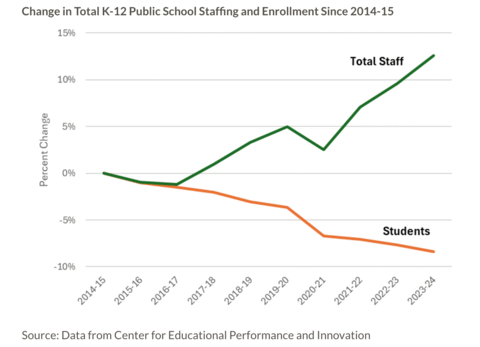Speech therapist could lose license for not completing implicit bias training
FOIA records show worker failed to complete 20 credit hours, including implicit bias training
(Editor's note: This article has been updated to include a quote from the Michigan licensing agency.)
The state of Michigan has sanctioned a speech-language pathologist for not completing implicit bias training, as required by a 2020 directive from Gov. Gretchen Whitmer.
Michiganders licensed by the state across 26 occupations must complete implicit bias training to renew a professional license.
New applicants must complete two hours of implicit bias training within the previous five years. Renewing licensees or registrants must complete one hour of implicit bias training for each year of their license cycle.
The Michigan Department of Licensing and Regulatory Affairs fined a speech-language pathologist $1,500 for not completing the continuing education requirement or the implicit bias training, according to an internal document Do No Harm, an organization that opposes diversity, equity, and inclusion programs, sent CapCon. Do No Harm obtained the Oct. 19, 2023, affidavit of a state compliance officer, as well as other documents, through a Freedom of Information Act request. The therapist was placed on probation on the condition of completing the required number of hours as well as implicit bias training. Failure to pay the fine and comply with the training requirement will result in the state terminating the person’s professional license.
The order was issued by the Disciplinary Subcommittee of the Michigan Board of Speech-Language Pathology. It said the person failed to submit proof of completing the bias requirement and was deficient by 20 credit hours of continuing education, including one hour of pain and pain symptom management training.
“Respondent is deficient 20 hours of continuous professional development, including 1 hour in pain and symptom management. Additionally, Respondent must complete training in implicit bias,” a disciplinary order says.
Do No Harm requested the licensing agency’s emails about implicit bias training, said Laura Morgan, its senior director of programs. The organization, according to its website, represents “physicians, nurses, medical students, patients, and policymakers focused on keeping identity politics out of medical education, research, and clinical practice.”
“We have universally heard from physicians, nurses, and other practitioners that being subjected to this requirement as a condition of licensure is ‘insulting,’ and has even caused some of them to forego renewing their licenses altogether,” Morgan said in a statement. In a time when the entire healthcare industry continues to struggle with provider shortages in all disciplines, Michigan's insistence on pushing an ideologically driven concept with the weak evidence that implicit bias has simply doesn't align with patient care-related needs and best practices.”
Richardson said the FOIA response shows that some departmental employees have not completed the implicit bias training.
One staff member replied to a reminder to complete the training by saying it “has nothing to do with the performance of my duties and I am fully capable of treating and do treat everyone with respect and cordiality that is due to all living beings.”
The staffer said he tried to complete the training but encountered an error in the online system and did not have the time to finish it.
Applicants and licensees who don’t complete implicit bias training might face penalties, Abby Rubley, the licensing agency’s director of communications, told CapCon.
“Applicants and licensees are required at initial licensure/renewal to attest that they have completed Implicit Bias Training, as well as other continuing education requirements for the specific profession as required,” Rubley wrote in an email. “In the event an individual is audited and found to not have taken the Implicit Bias Training, they may face penalties handed down by the respective profession’s licensing board.”
The documents the state provided to Do No Harm include a notice that reads:
“The State of Michigan is committed to an equitable and inclusive workplace through mitigating implicit bias. In 2019, the governor issued Executive Directive 2020-9 mandating state employees receive biennial implicit bias training.”
The agency also invited state employees to take a pronoun training class and to attend the “MI Family Pride” event in Lansing on Thursday, June 22.
Michigan Capitol Confidential is the news source produced by the Mackinac Center for Public Policy. Michigan Capitol Confidential reports with a free-market news perspective.


 Michigan dentist drills into implicit bias training rule
Michigan dentist drills into implicit bias training rule
 Michigan fines, disciplines at least 132 people under 2020 implicit bias training
Michigan fines, disciplines at least 132 people under 2020 implicit bias training
 Owosso barber still battling $9K in fines from Whitmer lockdown
Owosso barber still battling $9K in fines from Whitmer lockdown


 School survey asks high schoolers about sex, drug habits
School survey asks high schoolers about sex, drug habits
 Michigan House scheduled to vote June 20 on diverting $670M from teacher debt to other projects
Michigan House scheduled to vote June 20 on diverting $670M from teacher debt to other projects
 Michigan Education board member claims funding cuts after record funding
Michigan Education board member claims funding cuts after record funding